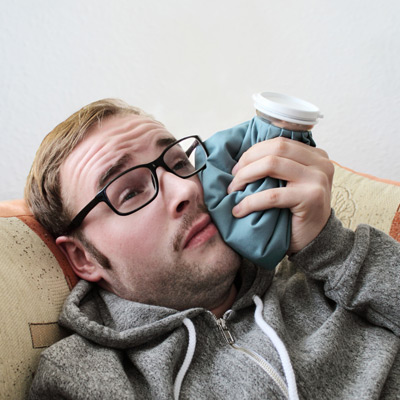How to Relieve Toothache at Night and Get More Sleep
02-05-2016

Toothache is a fairly common ailment that most of us have been unfortunate enough to experience at some point in our lives.
Toothache refers to pain in and/or around a tooth or jaws, and it can be felt in multiple ways; the pain may come and go, or it could be a constant ache. Toothache may also get worse while eating or drinking, especially if the food or drink is cold or hot.
Causes of toothache pain
There are a number of different factors that come into effect that may cause toothache pain. The primary causes of toothache include;
- Grinding teeth,
- Tooth decay,
- Sinusitis,
- Abscessed tooth,
- Infected gums
Whether mild or severe, this pain can be extremely upsetting and bothersome. But what’s even more frustrating is when toothache becomes a major impediment to catching a good night's slumber.

The Relationship between Toothache and Sleep
Tracey Marks, the author of the book titled "Master Your Sleep: Proven Methods Simplified,' an Atlanta based Psychiatrist, and a Medical Doctor says, "Toothache and all other severe pains stimulate your nerves to an intense degree. This sensation activates the brain, keeping you awake." She adds that "pain causes anxiety which disrupts your sleep further."
Mark's assertions are supported by The National Sleep Foundation which reports, "In addition to keeping one awake, toothache also causes difficulties in staying asleep. And once it has kept you awake the first night, it's highly likely to do so again." The organisation reports that 75% of people with chronic pain (which includes toothache) have difficulties sleeping. It lists the following as the major ways in which toothache causes a restless night:
• It disrupts your sleep architecture
• It alters your sleep position by keeping you from getting comfortable in bed.
Why do toothaches appear to get worse on an evening?
There are several reasons why toothache seems to become aggravated during the evening or when you are lying down in bed. These may include:
1. What you have for dinner:
Your toothache may get more painful after dinner, particularly if it’s a large meal, causing you great discomfort throughout the entire night. Also, having a hot, cold, sugary, acidic, or starchy evening meal can often worsen the existing problems with your teeth, leading to more pain.
2. Increased awareness:
During the day the hustle and bustle of daily life - school, work and other activities – can often keep you so preoccupied that you barely notice the toothache. However, during the evening when you finally get the chance to unwind away from all the distractions, the pain becomes obvious and may feel even more painful.
3. Clenching jaws during the day
When stressed or under great tension, many people often unintentionally grind their teeth or clench their jaws during the day. This results in a buildup of pain at night time, causing discomfort.
4. Your sleeping position
Your toothache can also appear to get worse when you get into bed. This is because, when one lies down, more blood rushes to the head, which puts considerable pressure on sensitive areas in the mouth. As a result, your toothache becomes more pronounced and unbearably painful due to your sleeping position.

How to Improve Your Sleep
There are many ways to relieve toothache but first and foremost we recommend you seek medical help. While tips and advice can be greatly helpful, in the long run, your best option is to seek medical assistance from a qualified dentist. In particular, when your toothache persists for longer than two days, it’s important to book an appointment with the dentist as soon as you can. If the toothache is not properly treated in good time, it could get worse and cause an infection to occur.
In the meantime, as you await the dentist’s appointment or the toothache has just begun, there are several tips that can be quite useful in easing the pain and allowing you to sleep better at night. These include:
1. Taking medication:
Taking over the counter pain relievers such as ibuprofen and paracetamol, may successfully alleviate your dental pain as your wait for your dentist’s appointment.
2. Elevating your head in bed:
When trying to get some sleep with a throbbing pain in your tooth, finding an agreeable sleeping position by using a good quality pillow wins half the battle. It limits the effect of increased blood pressure to the head relieving the pain associated with toothaches. When choosing the right pillow, a memory foam pillow is the most comfortable and supportive pillow on the market which will help to elevate your head for optimal sleep.
3. Keeping away from some foods and drinks:
Avoiding foods and drinks that are very hot or very cold and those that are sugary or acidic, during the day and particularly in the hours leading up to your sleeping time, may help to ward off toothache.
4. Keeping yourself busy:
Most people are more than happy to just put their feet up and watch their favourite program on TV. But do you know that if you are feeling pain, it’s usually a good idea to keep your brain actively engaged? Keeping your brain busy with stimulating activities takes your mind off the toothache, easing the pain in the hours before going to sleep.
5. Sleeping on the right mattress:
It is no secret that a good quality mattress will drastically improve your sleep at all times, even when you are experiencing a toothache. We recommend sleeping on a memory foam mattress as this type of mattress is comfortable, supportive and pressure-relieving. It keeps your whole body supported, preventing you from tossing and turning throughout the night.
However, do not compromise the principles of sleep hygiene. Even if you are experiencing pain just before going to bed, do not reach for that mobile phone, tablet, or laptop to help you forget about the ache. This is because, nighttime exposure to the light emanating from the screens of such electronic devices can replicate the effects of sunlight on your eyes’ photoreceptive cell, thereby confusing your body’s natural clock. The exposure gives your body a confusing impression that it’s still daytime. And as a result, rather than winding down in preparation for bedtime, the body thinks it should be trying to stay alert. As an alternative, consider reading your favourite magazine or any good book under dimmed light, or maybe simply having a conversation with a friend to distract you from thinking about the pain.

Natural Home Remedies for Toothache
Many people express great confidence in their own home remedies for easing toothaches, but in truth none have been scientifically proven to cure toothache in the long term. The trick here is to adopt the method that works best for you.
Some of the most famous home/ natural remedies include:
• Dipping a cotton ball in clove oil:
Dipping a cotton ball in clove oil (available at most pharmacies) and placing it on your toothache area, or applying a few drops of this oil on your gums. This remedy is supposed to numb your dental pain and provide relief, allowing you to have a restful night’s sleep.
• Swishing salt water in your mouth:
Dissolving a teaspoon of salt in a cup of warm water, and then swishing it in your mouth for about half a minute, and then spitting it out. This should be done just before going to sleep. The salt water cleanses the region around your affected tooth and aids in reducing any swelling and inflammation, while fighting the bacteria causing infection.
• Chewing on garlic cloves before sleeping:
Chewing on one or two garlic cloves to get relief from your toothache before sleeping - Garlic is said to have antibiotic and other medicinal properties, which can help to ease the pain effectively.
• Chewing on raw onion:
Chewing on raw onion for several minutes to reduce your tooth pain - Onions are supposed to have antimicrobial and antiseptic properties and can, therefore, reduce dental pain by killing the germs causing the infection.
• Placing an ice pack on the paining tooth:
Placing an ice pack (a small ice cube put in a plastic bag, then wrapped around with a thin cloth) on the paining tooth or on your cheek over the affected area, for about 15 minutes so as to numb your nerves, providing immediate relief from the tooth pain.
• Rinsing your mouth with hydrogen peroxide solution:
Rinsing your mouth with 3% hydrogen peroxide solution for several minutes at a time, to help relieve some discomfort as well as kill bacteria. This solution is supposed to provide temporary relief and should not be swallowed; spit it out after swishing and rinse with plain water.
• Flossing teeth:
Flossing to remove any clogged foods particles in your teeth that could be causing increased toothache at night.
• Peppermint tea:
Soothing the toothache with peppermint tea which not only has a nice flavor, but is also claimed to have some numbing power. The tea can be swallowed or spat out after swishing it around in your mouth. Also, it is believed that the astringent tannins present in strong black tea may help alleviate the dental pain by reducing swelling. In this case, you should place a wet, warm tea bag over the affected area for temporary relief.
• Vinegar and brown paper:
Distracting yourself with vinegar and brown paper in the hours before going to sleep: For this unusual remedy, you should dip a piece of brown paper (from a lunch or grocery bag) in vinegar, sprinkle black pepper on one side, and then hold this against your cheek. This should elicit a warm sensation on your cheek, which may just distract you from your ache.
• A wet cotton ball dipped in a powder mixture of soda and salt:
Placing a wet cotton ball dipped in a powder mixture of equal parts baking soda and salt, in between your cheek and teeth, but not directly in the affected tooth. This remedy is meant to relieve your tooth pain and pressure, promoting better sleep.
• Using a ginger-cayenne paste:
For this homemade cure, mix equal parts of ginger and cayenne spices, and add water to form a paste. Soak a small cotton ball in the mixture until it’s saturated and place it on the affected tooth whilst taking care not to touch your tongue and gums. This should be left in place until your dental pain fades away - or for as long as you are able to stand it, since the paste is very likely to burn.
Get relief from toothache and enjoy a good night’s sleep!
If you are suffering from toothache one of these few homemade natural remedies may help you relieve your dental pain and achieve a better night’s sleep. But bear in mind, these are not permanent cures and should not be used as such. We always recommend you see your local dentist or practitioner for dentistry and medical advice.
If you are looking to improve your sleep, a good quality mattress or pillow can help provide you with that extra bit of comfort and support that will give you a good night's sleep. Shop our Ergoflex 5G Memory Foam Mattress or our Ergoflex HD Memory Foam Pillow today.
Further Reading
If you enjoyed this article you will find the below of interest:
10 proven tips for better sleep
How sleeping with your phone is harming your life
Introducing the all-new Ergoflex 5G Memory Foam Mattress
